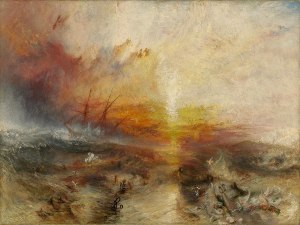Next London Theatre Seminar, 24 January 2019, 6:30 PM: Performing Oceans with Arabella Stanger (Sussex) and Matt Kerr (Southampton)
Posted: 11 January 2019 Filed under: seminars Leave a commentDear colleagues,
Our first London Theatre Seminar for 2019 will take place on 24 January 2019 at 6:30 PM, at 11 Bedford Square (RHUL Central London), Room 1-01. Please note change of venue owing to the ongoing boycott of UoL Senate House.
We are delighted to host an interdisciplinary panel on “Performing Oceans” with Matt Kerr (Lecturer in British Literature, 1837-1939, University of Southampton) and Arabella Stanger (Lecturer in Drama: Theatre and Performance, University of Sussex). As usual, start time is 6:30 PM. The seminar will close at 8:30 PM, to reconvene in a local pub. Wine and refreshments will be served in the break.
We look forward to seeing you there!
Broderick, Louise, and Bryce

JMW Turner, The Slave Ship, 1840

Sondra Perry, Typhoon Coming On (Installation View), 2018
Performing Oceans
This panel presents new research on oceans and performance from the perspectives of literary studies and of performance and dance studies. Thinking about the sea’s capacity to conceal and be concealed, we explore contemporary works of film and video installation that in various ways reimagine the sea as a (non)place of social dispersal.
‘Seas Unseen’
As a number of critics have recently pointed out (Urry 2014, Mack 2013, Blum 2010), the most distinctive feature of the sea in modernity is its disappearance. In spite of the surge in international shipping since the nineteenth century, and advances in marine science and oceanography, the sea has faded gradually from view, both literally and figuratively. As Allan Sekula put it in 1995, ‘The metropolitan gaze no longer falls upon the waterfront, and a cognitive blankness follows.’ Thus, although central to histories of trade, exploration, and cultural exchange which have shaped our modern world, oceans are the hidden spaces of modernity, represented as a vast empty terrain, a sublime realm of spiritual purity, or an out-of-sight zone of resource extraction, waste disposal, and dispersal. Using a new short film by the artist Simon Roberts as a test case, and focussing on the port at Southampton as a particular example, this paper takes some steps toward addressing that blankness by considering what strategies of visualisation might be appropriate for representing it. Also drawing on examples from J. M. W. Turner, Jane Austen, and John Keats, I will consider the links between the sea’s occlusion, modernity, labour, sublimity, and boredom.
Matt Kerr is a Lecturer in British Literature from 1837 to 1939 at the University of Southampton. His research centres on Victorian literature and culture. His work on the sea spans both well-known figures— Dickens, Mill, Ruskin—and neglected ones, such as Captain Marryat. His articles have appeared in Essays in Criticism, Review of English Studies, and Dickens Studies Annual, among other places.
‘Bodily Wreckage and the Middle Passage in Sondra Perry’s Typhoon Coming On (2018)’
In Sondra Perry’s installation Typhoon Coming On (2018) a digitally manipulated ocean flows around three walls of London’s Serpentine gallery, drawing visitors into the catastrophic seascape of a nineteenth-century abolitionist painting. The projection reworks J. M. W. Turner’s The Slave Ship (1840), depicting the Zong massacre of 1781 where the captain of a British slave ship threw 133 enslaved people overboard to claim compensation for their loss as ‘property’. A maritime catastrophe revealing antiblackness and finance capital to be co-constitutive phenomena, the Zong massacre provides both artists with the means to contemplate the Atlantic as a site for the transformation of bodily wreckage into economic salvage. This paper focusses on Perry’s remediation of Turner’s painting by thinking through their mobilizations of bodies-in-the-water. Where Turner figures brown limbs as debris in a tormented sea, Perry’s work melts Turner’s scene into a tranquil surround where the absence of detritus calls to the invisibilized, structural violence with which colonial modernity secures its futures. Perry’s is an anti-racist installation that moves its visitors beyond the moral content of Turner’s painting. In her dispersal of bodily wreckage from the Middle Passage, Perry presents that sea-born calamity as neither exceptional event punctuating the history of seafaring nor allegory for the tragedy of the slave trade but as the very foundation of racial capitalism.
Arabella Stanger is Lecturer in Drama: Theatre and Performance at the University of Sussex. Her work moves across dance and performance studies and explores the sociopolitical nature of choreography. Her current book project excavates the histories of spatial and racial dispossession underwriting idealistic dances of the Euro-American theatre dance canon, and she is embarking on new research into histories of maritime protest.
